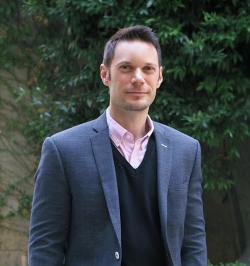November 16, 2016
9:00pm – 10:00pm
Lecture Hall 43-105 CHS
About the lecture: A growing, but contentious, area of concern is the ability of environmental exposures to elicit health effects across several generations. Besides mutations, alteration of the epigenome has provided a molecular mean by which exposures could become heritable if such changes happen in germ cells. In our laboratory, we use various model systems to investigate the effect of the highly prevalent chemical Bisphenol A on the epigenome of germ cells and examine how this affects their viability and mediates a memory of environmental exposure. We show that BPA elicits a strong transgenerational negative effect on reproduction and that the activity of histone demethylases is required for this inheritance.
About the speaker: Patrick Allard received his B.Sc from University of Toulouse, France and his M.Sc in Biology of Aging from University of Paris – Rene Descartes. He completed his Ph.D. degree in Biology from the University of McGill, Canada in the laboratory of Dr Hugh Clarke where he explored the genetic regulation of mammalian oogenesis. This work was followed by two concurrent postdoctoral fellowship positions in the laboratories of Dr Clifford Tabin and Dr Monica Colaiacovo in the Department of Genetics at Harvard Medical School. Dr Allard’s work resides at the intersection of genetics, epigenetics, developmental biology and environmental health. His research on the effect of environmental exposures on reproduction has been published in several high profile journals including Proceedings of the National Academy of Sciences (PNAS), PLOS Genetics and Environmental Health Perspectives. Dr Allard has received multiple awards and grants including the Colgate-Palmolive research grant, the Johns Hopkins Center for Alternatives to Animal Research grant and most notably a NIH K99/R00 Pathway to Independence Award as well as a Burroughs Wellcome Innovations in Regulatory Science Award. He was also named Global Toxicology Scholar by the Society of Toxicology in 2011 and 2014.

